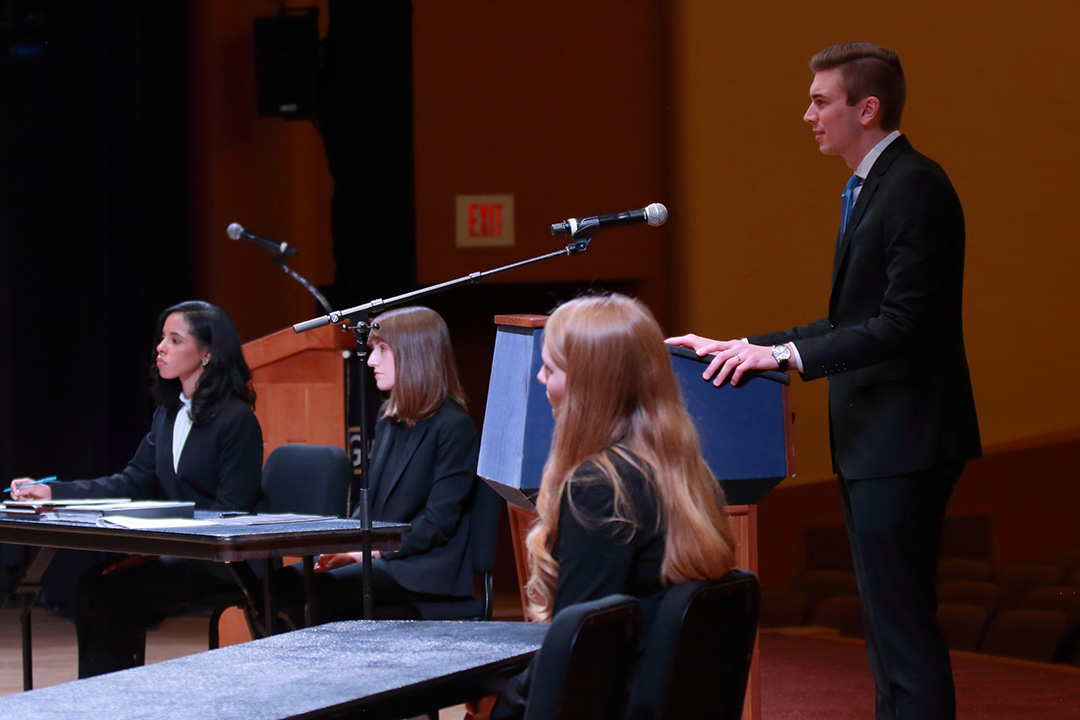By Tatyana Hopkins, GW Today
The stage in Lisner Auditorium was transformed into a courtroom Thursday when two GW Law advocacy teams argued a fictitious Supreme Court case before a panel of judges in the final round of the 2020 Van Vleck Constitutional Law Moot Court Competition. They faced multiple questions and hypotheticals from the panel of judges during their arguments.
The finalist teams argued before a bench including Judges Amy Coney Barrett of the Seventh US Circuit Court of Appeals, Steven M. Colloton of the Eighth Circuit and Roy W. McLeese III of the District of Columbia Court of Appeals.
[video:https://vimeo.com/388545211 width:560 height:315 align:center lightbox_title:2020 Van Vleck Constitutional Law Moot Court Finals]
This year’s competition focused on two legal issues drafted by student Moot Court Board members, Anna Mizzi, 3L, and Courtney Wiesner, 3L. It addressed the constitutionality of charging a criminal defendant without a grand jury indictment and imposing a 90-year sentence on a juvenile who is not convicted of a homicide.
The mock petitioner, Jacob Azrilyant, initiated an appeal of his 90-year sentence, imposed for robbing three individuals at gunpoint who were leaving a bar. He took $27 and an iPhone from the first victim, $15 from the second and $33 and a Samsung Galaxy mobile phone from the third. Mr. Azrilyant was 17 years old at the time of the crime, and said he intended to sell the phones because he was out of work, unsupported financially by parents and needed cash.
The respondent, the district attorney for the fictitious state of New Columbia, sought to uphold the conviction, which had been upheld by lower courts. The case had now reached the United States Supreme Court.
The four competitors—married couple Ashlyn Roberts, 2L, and Shane Roberts, 2L, for the petitioner and Samrin Ali, 2L, and Muamera Hadzic, 2L, for the respondent—argued and analyzed two separate issues: first, whether petitioner’s constitutional right to due process was violated by charging him through criminal information rather than a grand jury indictment; and second, whether it is constitutional to impose a mandatory sentence of 90 years without parole on a juvenile not convicted of homicide where that sentence amounts to the remainder of his expected life.
The Roberts appearance was the first time that a married couple made it to the finals of the competition.
The Van Vleck competition is the law school’s largest and longest-running advocacy competition and is named for the school’s longest-serving dean, William C. Van Vleck. Its aim is to provide students with the opportunity to develop their oral and written advocacy skills by engaging in mock appellate litigation.
The final was the culmination of six rounds that began in September with 108 students, in which each team of two competitors submitted a written brief and presented oral arguments for the side they represented.
Each year, the winning team receives the Jacob Burns Award during a ceremony the day before Commencement.
This year, the judges voted in favor of the Roberts for the best overall team. Additionally, the Roberts also placed third in the competition’s overall best brief category.
After announcing the final decision, the judges congratulated the participants on their performances and shared advocacy tips with them such as engaging the court in a conversation and concisely answering questions.
"We were impressed across the board with the advocates," said Judge Colloton, who served as chief justice.
Judge Barrett praised the student advocates for being able to think quickly without relying on notes despite being overwhelmed with questions from the bench during their arguments.
"We rank you up with the very talented advocates who appear before me in the Seventh Circuit," she said.
Judge McLeese agreed. He said the students presented confidently while succinctly answering tough questions. "I didn't feel like there was [any] question that I had thought of that I couldn't ask because you folks were handling the questions that we asked so well," he said. "You folks aren’t lawyers yet, but you’ve done an incredible job."


